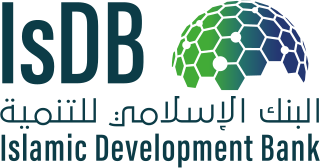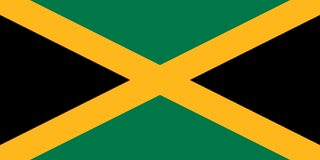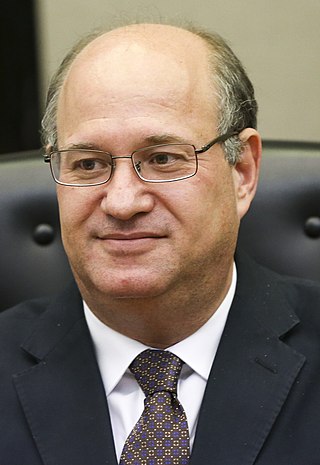
The Inter-American Development Bank is an international development finance institution headquartered in Washington,D.C.,United States of America,and serving as the largest source of development financing for Latin America and the Caribbean. Established in 1959,the IDB supports Latin American and Caribbean economic development,social development and regional integration by lending to governments and government agencies,including State corporations.

The Islamic Development Bank is a multilateral development finance institution that is focused on Islamic finance for infrastructure development and located in Jeddah,Saudi Arabia. There are 57 shareholding member states with the largest single shareholder being Saudi Arabia.

Water privatization is short for private sector participations in the provision of water services and sanitation. Water privatization has a variable history in which its popularity and favorability has fluctuated in the market and politics. One of the common forms of privatization is public–private partnerships (PPPs). PPPs allow for a mix between public and private ownership and/or management of water and sanitation sources and infrastructure. Privatization,as proponents argue,may not only increase efficiency and service quality but also increase fiscal benefits. There are different forms of regulation in place for current privatization systems.

Luis Alberto Moreno Mejía is a Colombian businessman and former diplomat who served as President of the Inter-American Development Bank (IADB) from 2005 to 2020. He was also Colombia's Ambassador to the United States under President Andrés Pastrana Arango from 1998 to 2005,and is the former President of the Instituto de Fomento Industrial. He currently serves as a member of the Board of Trustees at the World Economic Forum (WEF) since 2011.

Water supply and sanitation in Latin America is characterized by insufficient access and in many cases by poor service quality,with detrimental impacts on public health. Water and sanitation services are provided by a vast array of mostly local service providers under an often fragmented policy and regulatory framework. Financing of water and sanitation remains a serious challenge.
Water supply and sanitation in Colombia have been improved in many ways over the past decades. Between 1990 and 2010,access to improved sanitation increased from 67% to 82%,but access to improved water sources increased only slightly from 89% to 94%. In particular,coverage in rural areas lags behind. Furthermore,despite improvements,the quality of water and sanitation services remains inadequate. For example,only 73% of those receiving public services receive water of potable quality and in 2006 only 25% of the wastewater generated in the country underwent any kind of treatment.
Guyana,meaning "land of many waters",is rich in water resources. Most of the population is concentrated in the coastal plain,much of which is below sea level and is protected by a series of sea walls. A series of shallow reservoirs inland of the coastal plain,called "water conservancies",store surface water primarily for irrigation needs. Key issues in the water and sanitation sector in Guyana are poor service quality,a low level of cost recovery and low levels of access.
Access to at least basic water increased from 94% to 97% between 2000 and 2015;an increase in access to at least basic sanitation from 73% to 86% in the same period;
Drinking water and sanitation in Nicaragua are provided by a national public utility in urban areas and water committees in rural areas. Despite relatively high levels of investment,access to drinking water in urban areas has barely kept up with population growth,access to urban sanitation has actually declined and service quality remains poor. However,a substantial increase in access to water supply and sanitation has been reached in rural areas.

Drinking water supply and sanitation in Argentina is characterized by relatively low tariffs,mostly reasonable service quality,low levels of metering and high levels of consumption for those with access to services. At the same time,according to the WHO,21% of the total population remains without access to house connections and 52% of the urban population do not have access to sewerage. The responsibility for operating and maintaining water and sanitation services rests with 19 provincial water and sewer companies,more than 100 municipalities and more than 950 cooperatives,the latter operating primarily in small towns. Among the largest water and sewer companies are Agua y Saneamientos Argentinos (AYSA) and Aguas Bonarenses S.A. (ABSA),both operating in Greater Buenos Aires,Aguas Provinciales de Santa Fe,and Aguas Cordobesas SA,all of them now publicly owned. In 2008 there were still a few private concessions,such as Aguas de Salta SA,which is majority-owned by Argentine investors,and Obras Sanitarias de Mendoza (OSM).
AndréMedici is a Brazilian health economist with a background in health strategy,public and private health financing in Latin America and the Caribbean,social security and pensions,economic reform,gender health issues,environmental protection,and globalization. He is currently a Senior Health Specialist at the Inter-American Development Bank,in Washington,DC.
Bolivia's drinking water and sanitation coverage has greatly improved since 1990 due to a considerable increase in sectoral investment. However,the country continues to suffer from what happens to be the continent's lowest coverage levels and from low quality of services. Political and institutional instability have contributed to the weakening of the sector's institutions at the national and local levels. Two concessions to foreign private companies in two of the three largest cities—Cochabamba and La Paz/El Alto—were prematurely ended in 2000 and 2006 respectively. The country's second largest city,Santa Cruz de la Sierra,relatively successfully manages its own water and sanitation system by way of cooperatives. The government of Evo Morales intends to strengthen citizen participation within the sector. Increasing coverage requires a substantial increase of investment financing.

Antonio Ortiz Mena was a Mexican economist who served as President of the Inter-American Development Bank (1971–1988) and as Mexico's Secretary of Finance during the administrations of Adolfo López Mateos and Gustavo Díaz Ordaz (1958–1970).
Despite many years of concerted efforts and achievements in expanding coverage and improving service sustainability,many issues remain to be addressed in the water and sanitation sector. Key issues include:(i) a low level of coverage for both water and sanitation,in particular in rural areas;(ii) a low level of cost recovery,despite a legal obligation for tariffs to recover costs;and (iii) an institutional framework that is only partially effective.

Water supply and sanitation in Jamaica is characterized by high levels of access to an improved water source,while access to adequate sanitation stands at only 80%. This situation affects especially the poor,including the urban poor many of which live in the country's over 595 unplanned squatter settlements in unhealthy and unsanitary environments with a high risk of waterborne disease. Despite a number of policy papers that were mainly focused on water supply and despite various projects funded by external donors,increases in access have remained limited.

Mauricio Claver-Carone is an American private-equity investor,former Treasury Department and National Security Council official,lawyer,and lobbyist,who was the president of the Inter-American Development Bank from October 2020 until September 26,2022.

Carlos M. Jarque Uribe is a Mexican economist,currently Executive Director of América Móvil and Board Member of the Leading Global Group in Citizen Services FCC. He has had a distinguished career in the private sector,in public service and in the academic world.

Rogelio Frigerio is an Argentine economist and politician. Since 2023,he has been Governor of Entre Ríos Province.

Ilan Goldfajn is a Brazilian economist,former governor of the Central Bank of Brazil and former director of the International Monetary Fund's Western Hemisphere Department. In December 2022,he became president of the Inter-American Development Bank.

Anabel González is an economic development expert. She is currently Vice President for Countries at the Inter-American Development Bank (IDB).













